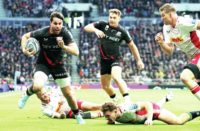 I think it is fair to say that 2012 was Stuart Lancaster's year more than anyone else in rugby, despite no major competition wins. Many put his success down to a number of psychological ploys from calling on motivational people from outside rugby to give pep talks, to getting the players friends and family to write what it means to them having a son, brother, husband or partner playing for England.
I think it is fair to say that 2012 was Stuart Lancaster's year more than anyone else in rugby, despite no major competition wins. Many put his success down to a number of psychological ploys from calling on motivational people from outside rugby to give pep talks, to getting the players friends and family to write what it means to them having a son, brother, husband or partner playing for England.
I must admit to having a slightly sceptical view of all these motivational ideas, particularly when they are made public (even if they were not supposed to be).
No players would dare say if they thought these methods were a waste of time, especially once so many of the Press have trumpeted them as one of the major reasons for the team's success, but also because if the coach says jump and you want to be in the team, you say how high.
Back when I was playing in 1992 Victor Ubogu came into the England team to face Canada and South Africa.
The captain, Will Carling, knowing that Victor, although a great player around the field was not a good scrumager, decided that all the players should write down a list of what we thought were Victor's virtues so as to boost his confidence.
The collated notes were left in Victor's room for him to read which I am sure he did before tearing them up and throwing them into the bin.
I say that because, knowing Victor, I am assuming he, like me, had worked his nuts off for the opportunity to play for England and would have thought it was very condescending of other players to think they had a right to comment on another's ability.
England won both matches and Victor played well around the field but was found wanting in the scrum and I was brought back to play in the 1993 Five Nations Championship.
As for asking my wife or parents to write what it meant to them for me playing for England? I am not sure the coaches would have got the answer they were expecting.
I come from Shoreditch in the middle of London (an area not known as a rugby hotspot!) and never knew anything about rugby until following my elder brother to the London Nautical School where I was introduced to the game.
Although I continued playing after leaving school, it wasn't until much later and a number of years gaining experience at Old Albanians with some great props like Daryl Druce and Peter Blake-Turner that I decided to give it a go and try and play at the best level I could.
I was just married and working for a city-based law firm but as I needed to dedicate more time to rugby, if I was to give it my best shot, I left law and went to work in my father's furniture company.
He had been born and brought up in the Shoreditch area and had no interest or understanding about the game, other than the fact that his two sons played it.
When I was selected for an England squad and began touring (including the 1987 World Cup) the game was still amateur and was my hobby as I had a young family.
Fortunately, my father continued to pay me while I was involved with the England squad – thereby effectively sponsoring me.
To him, the game took me away from the company, cost it money and was of no benefit whatsoever, as none of our customers (some of whom were Paris based) were the least bit interested in the game.
In fact, the only time we did get a rugby- related order was from a company in Yorkshire who ordered the cheapest thing we made and then asked for tickets to an international!
I was not alone in this as all players who did not have a rugby-related job would have been in a similar, if not a worse position. Paul Rendall (who also had a young family) was a self-employed engineer who stopped earning as soon as he came away from his job.
While on England duty he was injured (a torn Achilles tendon) and although the RFU paid for his operation they offered no financial help while he convalesced and so he was forced to return to work just two weeks after the operation still on crutches.
Most senior players today see the game as an occupation and it is likely that their parents would have had a lot more to do with the decision as to whether or not to make it full-time.
Whatever a child achieves make a parent proud and happy, so a successful career in rugby culminating in playing internationally with the financial rewards it now brings will be something special, but that will not be the driving force that makes a player want to do it.
To know you have the support and backing of those you care for is important but not essential. In fact it is my opinion that those letters probably put an unnecessary pressure on some of the players.
I would also think that if you are close to someone who achieves their ambitions you would tell them how proud and pleased you are without the need to be asked.
My father attended only two of my matches, my first in Paris and the World Cup final at Twickenham. After that first game I met him in the post-match function at Parc de Princes where, although we lost 10-9 the room was abuzz with the president of France, the British ambassador and all the great and the good of English and French rugby, along with the Press.
My dad stood there shaking his head and saying that he never realised that the silly game I played could lead to this!
Despite the fact that the game held no interest for him I always knew I had his support without anyone asking him to write a letter.


























